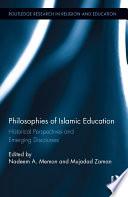
Teacher Training and Education in the GCC
Unpacking the Complexities and Challenges of Internationalizing Educational Contexts
This multidisciplinary edited volume examines the complexities and challenges of internationalizing education in the GCC. This book is a practical tool and resource to provide educators and schools of education with authentic insights, strategies, and research to further advance teacher education and training in the GCC and globally.
- ISBN 13 : 1793636745
- ISBN 10 : 9781793636744
- Judul : Teacher Training and Education in the GCC
- Sub Judul : Unpacking the Complexities and Challenges of Internationalizing Educational Contexts
- Pengarang : Naved Bakali, Nadeem A. Memon, Nadeem A. Memon, Nadeem A. Memon,
- Kategori : Education
- Penerbit : Rowman & Littlefield
- Bahasa : en
- Tahun : 2021
- Halaman : 237
- Google Book : http://books.google.co.id/books?id=0V1BEAAAQBAJ&dq=intitle:Teacher+Training+Professional+Development&hl=&source=gbs_api
-
Ketersediaan :
This book is a practical tool and resource to provide educators and schools of education with authentic insights, strategies, and research to further advance teacher education and training in the GCC and globally.




